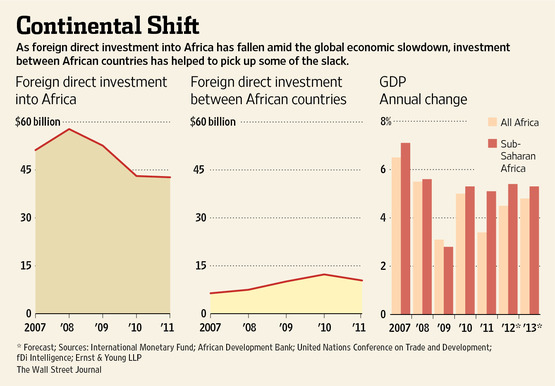 WSJ story on how Africans are starting to invest in Africa in a big way. We're talking FDI, or foreign direct invesment that crosses borders and, in contrast to stock markets, represents "sticky money" in that it involves investment "directly" into assets.
WSJ story on how Africans are starting to invest in Africa in a big way. We're talking FDI, or foreign direct invesment that crosses borders and, in contrast to stock markets, represents "sticky money" in that it involves investment "directly" into assets.
Historically, when a region takes off, it's local money followed by extra-regional money in terms of sequencing. Same holds with panics: local money freaks first, triggering same with extra-regional.
Afric is different, because so much of its wealth, once captured by its elites, has gone abroad (I've seen estimates as high as 40%). Word has been that a good portion of that money is now coming back to take advantage of things.
But this story is about big commercial entities across Africa getting more into cross-border investments, which is incredibly positive. I have run into a certain amount of this in my own dealings on the continent, with tiny Mauritius playing the Singapore role.
What the charts show: Although the financial panic of late 2008 didn't make a dent, because Africa's financial connectivity (hence exposure) is limited, the slow down does eventually impact extra-Africa FDI: big Western markets slow and that slows Asian exports and that slows FDI into Africa generally because the continent is first and foremost a raw materials supplier.
But the good news of the piece: Africans themselves have picked up a decent portion of the slack, which is quite encouraging.
Total self-sustainable liftoff? Hardly. Africa's great hope of the past few years is that rising Asia (and other developing risers) might provide a sustained demand for materials that the West, in its more isolated boom-and-bust cycles of the Cold War, ever could.
Some concern there as we all now watch China slow down - inevitably - as it moves from extensive (at least along the coast) to intensive growth. The hidden hope there? China goes intensive along the coast and keeps taking advantage of extensive growth in the interior.